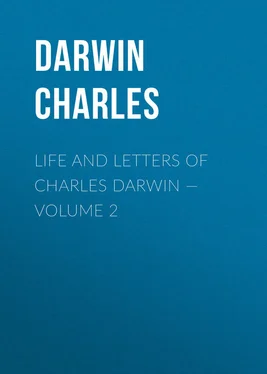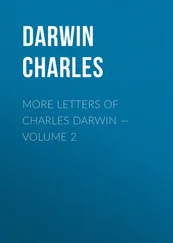Charles Darwin - Life and Letters of Charles Darwin — Volume 2
Здесь есть возможность читать онлайн «Charles Darwin - Life and Letters of Charles Darwin — Volume 2» — ознакомительный отрывок электронной книги совершенно бесплатно, а после прочтения отрывка купить полную версию. В некоторых случаях можно слушать аудио, скачать через торрент в формате fb2 и присутствует краткое содержание. Жанр: foreign_antique, foreign_prose, на английском языке. Описание произведения, (предисловие) а так же отзывы посетителей доступны на портале библиотеки ЛибКат.
- Название:Life and Letters of Charles Darwin — Volume 2
- Автор:
- Жанр:
- Год:неизвестен
- ISBN:нет данных
- Рейтинг книги:3 / 5. Голосов: 1
-
Избранное:Добавить в избранное
- Отзывы:
-
Ваша оценка:
- 60
- 1
- 2
- 3
- 4
- 5
Life and Letters of Charles Darwin — Volume 2: краткое содержание, описание и аннотация
Предлагаем к чтению аннотацию, описание, краткое содержание или предисловие (зависит от того, что написал сам автор книги «Life and Letters of Charles Darwin — Volume 2»). Если вы не нашли необходимую информацию о книге — напишите в комментариях, мы постараемся отыскать её.
Life and Letters of Charles Darwin — Volume 2 — читать онлайн ознакомительный отрывок
Ниже представлен текст книги, разбитый по страницам. Система сохранения места последней прочитанной страницы, позволяет с удобством читать онлайн бесплатно книгу «Life and Letters of Charles Darwin — Volume 2», без необходимости каждый раз заново искать на чём Вы остановились. Поставьте закладку, и сможете в любой момент перейти на страницу, на которой закончили чтение.
Интервал:
Закладка:
My dear Darwin,
You have my hurried letter telling you of the arrival of the remainder of the sheets of the reprint, and of the stir I had made for a reprint in Boston. Well, all looked pretty well, when, lo, we found that a second New York publishing house had announced a reprint also! I wrote then to both New York publishers, asking them to give way to the AUTHOR and his reprint of a revised edition. I got an answer from the Harpers that they withdraw — from the Appletons that they had got the book OUT (and the next day I saw a copy); but that, "if the work should have any considerable sale, we certainly shall be disposed to pay the author reasonably and liberally."
The Appletons being thus out with their reprint, the Boston house declined to go on. So I wrote to the Appletons taking them at their word, offering to aid their reprint, to give them the use of the alterations in the London reprint, as soon as I find out what they are, etc. etc. And I sent them the first leaf, and asked them to insert in their future issue the additional matter from Butler (A quotation from Butler's 'Analogy,' on the use of the word natural, which in the second edition is placed with the passages from Whewell and Bacon on page ii, opposite the title-page.), which tells just right. So there the matter stands. If you furnish any matter in advance of the London third edition, I will make them pay for it.
I may get something for you. All got is clear gain; but it will not be very much, I suppose.
Such little notices in the papers here as have yet appeared are quite handsome and considerate.
I hope next week to get printed sheets of my review from New Haven, and send [them] to you, and will ask you to pass them on to Dr. Hooker.
To fulfil your request, I ought to tell you what I think the weakest, and what the best, part of your book. But this is not easy, nor to be done in a word or two. The BEST PART, I think, is the WHOLE, i.e., its PLAN and TREATMENT, the vast amount of facts and acute inferences handled as if you had a perfect mastery of them. I do not think twenty years too much time to produce such a book in.
Style clear and good, but now and then wants revision for little matters (page 97, self-fertilises ITSELF, etc.).
Then your candour is worth everything to your cause. It is refreshing to find a person with a new theory who frankly confesses that he finds difficulties, insurmountable, at least for the present. I know some people who never have any difficulties to speak of.
The moment I understood your premisses, I felt sure you had a real foundation to hold on. Well, if one admits your premisses, I do not see how he is to stop short of your conclusions, as a probable hypothesis at least.
It naturally happens that my review of your book does not exhibit anything like the full force of the impression the book has made upon me. Under the circumstances I suppose I do your theory more good here, by bespeaking for it a fair and favourable consideration, and by standing non-committed as to its full conclusions, than I should if I announced myself a convert; nor could I say the latter, with truth.
Well, what seems to me the weakest point in the book is the attempt to account for the formation of organs, the making of eyes, etc., by natural selection. Some of this reads quite Lamarckian.
The chapter on HYBRIDISM is not a WEAK, but a STRONG chapter. You have done wonders there. But still you have not accounted, as you may be held to account, for divergence up to a certain extent producing increased fertility of the crosses, but carried one short almost imperceptible step more, giving rise to sterility, or reversing the tendency. Very likely you are on the right track; but you have something to do yet in that department.
Enough for the present.
... I am not insensible to your compliments, the very high compliment which you pay me in valuing my opinion. You evidently think more of it than I do, though from the way I write [to] you, and especially [to] Hooker, this might not be inferred from the reading of my letters.
I am free to say that I never learnt so much from one book as I have from yours, there remain a thousand things I long to say about it.
Ever yours, ASA GRAY.
CHARLES DARWIN TO ASA GRAY. [February? 1860].
... Now I will just run through some points in your letter. What you say about my book gratifies me most deeply, and I wish I could feel all was deserved by me. I quite think a review from a man, who is not an entire convert, if fair and moderately favourable, is in all respects the best kind of review. About the weak points I agree. The eye to this day gives me a cold shudder, but when I think of the fine known gradations, my reason tells me I ought to conquer the cold shudder.
Pray kindly remember and tell Prof. Wyman how very grateful I should be for any hints, information, or criticisms. I have the highest respect for his opinion. I am so sorry about Dana's health. I have already asked him to pay me a visit.
Farewell, you have laid me under a load of obligation — not that I feel it a load. It is the highest possible gratification to me to think that you have found my book worth reading and reflection; for you and three others I put down in my own mind as the judges whose opinions I should value most of all.
My dear Gray, yours most sincerely, C. DARWIN.
P.S. — I feel pretty sure, from my own experience, that if you are led by your studies to keep the subject of the origin of species before your mind, you will go further and further in your belief. It took me long years, and I assure you I am astonished at the impression my book has made on many minds. I fear twenty years ago, I should not have been half as candid and open to conviction.
CHARLES DARWIN TO J.D. HOOKER. Down, [January 31st, 1860].
My dear Hooker,
I have resolved to publish a little sketch of the progress of opinion on the change of species. Will you or Mrs. Hooker do me the favour to copy ONE sentence out of Naudin's paper in the 'Revue Horticole,' 1852, page 103, namely, that on his principle of Finalite. Can you let me have it soon, with those confounded dashes over the vowels put in carefully? Asa Gray, I believe, is going to get a second edition of my book, and I want to send this little preface over to him soon. I did not think of the necessity of having Naudin's sentence on finality, otherwise I would have copied it.
Yours affectionately, C. DARWIN.
P.S. — I shall end by just alluding to your Australian Flora Introduction. What was the date of publication: December 1859, or January 1860? Please answer this.
My preface will also do for the French edition, which I BELIEVE, is agreed on.
CHARLES DARWIN TO J.D. HOOKER. February [1860].
... As the 'Origin' now stands, Harvey's (William Henry Harvey was descended from a Quaker family of Youghal, and was born in February, 1811, at Summerville, a country house on the banks of the Shannon. He died at Torquay in 1866. In 1835, Harvey went to Africa (Table Bay) to pursue his botanical studies, the results of which were given in his 'Genera of South African Plants.' In 1838, ill-health compelled him to obtain leave of absence, and return to England for a time; in 1840 he returned to Cape Town, to be again compelled by illness to leave. In 1843 he obtained the appointment of Botanical Professor at Trinity College, Dublin. In 1854, 1855, and 1856 he visited Australia, New Zealand, the Friendly and Fiji Islands. In 1857 Dr. Harvey reached home, and was appointed the successor of Professor Allman to the Chair of Botany in Dublin University. He was author of several botanical works, principally on Algae. — (From a Memoir published in 1869.)) is a good hit against my talking so much of the insensibly fine gradations; and certainly it has astonished me that I should be pelted with the fact, that I had not allowed abrupt and great enough variations under nature. It would take a good deal more evidence to make me admit that forms have often changed by saltum.
Читать дальшеИнтервал:
Закладка:
Похожие книги на «Life and Letters of Charles Darwin — Volume 2»
Представляем Вашему вниманию похожие книги на «Life and Letters of Charles Darwin — Volume 2» списком для выбора. Мы отобрали схожую по названию и смыслу литературу в надежде предоставить читателям больше вариантов отыскать новые, интересные, ещё непрочитанные произведения.
Обсуждение, отзывы о книге «Life and Letters of Charles Darwin — Volume 2» и просто собственные мнения читателей. Оставьте ваши комментарии, напишите, что Вы думаете о произведении, его смысле или главных героях. Укажите что конкретно понравилось, а что нет, и почему Вы так считаете.












